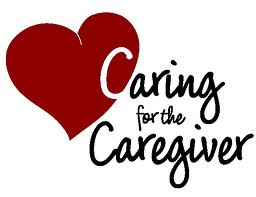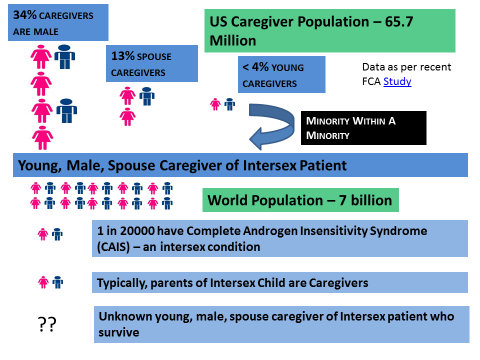 Androgen Insensitivity Syndrome (AIS) is a condition that affects sexual development before birth and during puberty. People with this condition are genetically male. They may have female sex characteristics or signs of both male and female sexual development. Frankly due to the severe lack of resources for caregivers of AIS or intersex patients and given the secrecy and lying around intersex, I tend to find lot of useful resources for caregivers by learning from other caregivers. One of the group of caregivers I have found a lot of useful information from is Alzheimer caregivers. As a debt of gratitude to everyone associated with Alzheimers – patients, caregivers, doctors, nurses, science and so many others, it is a great job you have done in educating others. We may not have answers but raising the awareness provides a ray of hope getting closer to the answer. Change always starts with something new and something small. I pray and hope that the intersex community also takes an inclusive approach between patients, caregivers, family members, doctors, nurses, and the entire ecosystem.
Androgen Insensitivity Syndrome (AIS) is a condition that affects sexual development before birth and during puberty. People with this condition are genetically male. They may have female sex characteristics or signs of both male and female sexual development. Frankly due to the severe lack of resources for caregivers of AIS or intersex patients and given the secrecy and lying around intersex, I tend to find lot of useful resources for caregivers by learning from other caregivers. One of the group of caregivers I have found a lot of useful information from is Alzheimer caregivers. As a debt of gratitude to everyone associated with Alzheimers – patients, caregivers, doctors, nurses, science and so many others, it is a great job you have done in educating others. We may not have answers but raising the awareness provides a ray of hope getting closer to the answer. Change always starts with something new and something small. I pray and hope that the intersex community also takes an inclusive approach between patients, caregivers, family members, doctors, nurses, and the entire ecosystem.
Young, male, spousal caregivers of intersex patients are a minority within a minority. There are so many similarities and dissimilarities between caregivers of Alzheimer and AIS or intersex. Especially, when so much information is available on Alzheimer. Apologies in advance if there is a misunderstanding of Alzheimer’s as the experience is strictly from learning from other Alzheimer resources and caregivers.
Some Similarities for Caregivers of Alzheimer and AIS or Intersex:
| Both conditions affects the entire family. Alzheimer is a traumatic condition for the patient and for the caregiver. As much as it is a physical medical condition, it is also a mental health and emotional condition like AIS. The patient caregiver is often referred to as a "second patient" of the condition. | |
| Conflicting emotions of love and Caregivers Guilt are often cited by caregivers. Patients with either of the condition require regular care — a responsibility that generally falls to a family member. The caregiver - be it a spouse, sibling, child, friend, or a loved one has a deep bond for the loved one, the patient. | |
| The change in personality, cognitive skills, emotional well-being and violent behavior in rare cases is common between patients. It is a state of emotional comatose. While the changes are explainable medically in either patients of Alzheimer and AIS, the medical condition makes a huge impact on the caregiver. Up until the treatment starts, there is a great emotional connect between the patient and the caregiver. With the advancement of the condition/treatment, the caregiver has possibly lost their emotional partner. Is the caregiver living through the medical condition through the loved one, the patient? | |
| Through sickness and in health. In the early years of caregivers for Alzheimer's, there were hardly any support groups with a common aim. There was no "release channel" for the caregiver to just let it out with a fellow caregiver. Just to have a shoulder to cry on and get recharged again to care for the loved one. It is through some great advocacy and predecessors that today we have Caregiver Bill of Rights. Intersex caregivers lack support. Both caregivers stay to keep their vow to the loved one through great sacrifices. | |
| Very little information and resources available for caregivers. In the early years of Alzheimer's, the caregivers were provided with little information and there was no "manual for dummies" for caregivers. It was a forced, circumstantial situation and as a caregiver you either accepted the loved one or did not. For young, male, spousal caregivers of AIS and given the sensitivity of the condition; the spouse, a non-blood family member does not enjoy the same access to health care information due to privacy. | |
| Conflict within the family as to who would be the caregiver. If long-distances are involved within the family, the caregiving responsibility falls solely on a single caregiver who is closest with the patient, typically a spouse. | |
| For the caregiver, taking care of the loved one is a full-time event including dealing with their own life. For others including members of the family, it is a "sad" event for a loved one and are very removed from what it takes to be a caregiver on a day-to-day basis. | |
| As a caregiver, their life comes to a stand-still. You are responsible for household chores, paying the bills on time, finances, social calendars, and so on. Caregivers often put their careers on hold or pick careers offering more flexibility to take care of a loved one. | |
| Intimacy. While not a deeply discussed topic, it is important. For the spousal caregiver, the loss of loving touches, loss of emotions from their loved one is devastating and any sexual desires are put on hold while the patient, the loved one recovers. The patient's behavior is due to the medical condition but the spousal caregiver also needs emotional and moral intimacy. | |
Some Dissimilarities for Caregivers of Alzheimer and AIS or Intersex:
| One in eight older Americans has Alzheimer's. One in 20000 births has AIS. Consequently, the number of caregivers for Alzheimers is far greater than caregivers of AIS. Scant to no resources, support groups, advocacy for caregivers of AIS are available They are reinventing the wheel that some great predecessors have already fought for. | |
| For spousal caregivers of AIS, chances are high that they were lied to and betrayed given the Intersex protocol of brainwashing, propoganda, and falsifying medical records. In addition to all other issues of a patient caregiver, he also has to deal with betrayal and distrust Vs. sensitivity. It is a tall order at such a young age and at beginning of a relationship. | |
| There is little known information on specific causes of Alzheimer's but there is a widespread awareness which helps funds for research and hope for a cure. The typical age of an Alzheimer patient is much older. In the meantime, plenty of support and training is available for caregivers who are the best defense for fighting against the condition. More than 15 million Americans provide unpaid care for Alzhiemer patients. In contrast, AIS is a well-understood condition medically and typically is diagnosed pre-puberty or at or around puberty. No one can predict if the spouse you marry may get Alzheimer's down the road. But AIS patients can choose to share with the spouse up-front about their genetic condition especially in the sanctity of a marriage. Very little or no support is available for the unpaid young, male, spousal caregivers of AIS. | |
| Alzheimer patients have visible physical symptoms and have mental health issues. AIS patients have few visible symptoms and have mental health issues dealing with the severe trauma and crisis. The "state of mind" is a complex situation to understand and solve. In the social context, it is easier for people to see a visible symptom and offer care but miss out on the "big" mental health issue. | |
| Alzheimer patients, at a much older age, are not necessarily the primary care providers of infants or children. AIS patients could be primary care providers for infants immediately following treatment. There is NO data on this situation, it is unprecedented. Can a person under severe stress and trauma undergoing intersex surgery treatment be a primary care provider for an infant or a child? What does this do to the entire patient-caregiver dynamic? There are plenty of experiences where a caregiver with children is also caring for a dear parent or sibling or loved one with Alzheimer's. But being a caregiver for your spouse with Alzheimer and a primary care provider for your infant at the same time is rare. | |
| Given the typical age of Alzheimer patients, there may be other age related issues. The symptoms are physical and easier to identify. Sadly, these are medical issues closer to end of life and the social context is much different towards a Alzheimer patient. In an AIS patient who has treatment as an adult while in a marriage, a huge remainder of life remains after the treatment stabilizes. The symptoms are more psychosexual issues and hard to pin down unless people around the patient know the truth. The social context is very different towards a young, AIS patient who has been through severe trauma and crisis. What about the caregivers? Did they live the condition through their loved one's trauma and crisis? | |
| For AIS caregivers, if the caregiver is a spouse, the caregiver would be in the category of a young, male, spousal caregiver - a minority within a minority. The length of the relationship between spouses is too small. Is there an equivalent bond of love and deep commitment? The caregiver's peer group is young and hard to find a "fellow empathizer" as opposed to several caregivers of Alzheimer. The support system for young, male, spousal caregivers of AIS is non-existent at best. | |





 Facebook
Facebook GooglePlus
GooglePlus RSS
RSS Twitter
Twitter